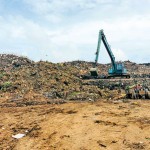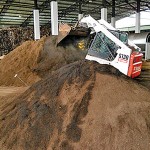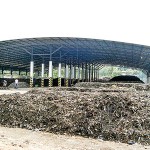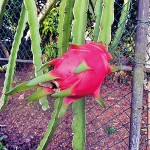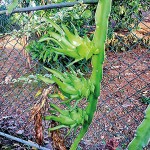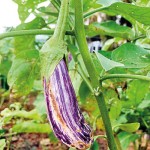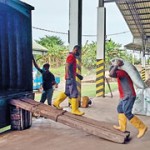News
Waste not, want not
With farmers complaining of a lack of fertiliser, many of them are trying to produce their own organic fertiliser, but experts warn that it should be done in a proper manner.
Producing compost from old garbage dumps could pose a danger to agriculture, Nalin Mannapperuma, Director, Solid Waste Management Authority, Western Province, said.
- Finished product
- Work in progress
- Dragon fruit
- The dragon fruit tree
- Eggplant, also aubergine or brinjal
- Solid waste is not properly segregated making it hard to produce good compost
- Off to fertilise our crops
- Compost heap
- Organic fertiliser, or compost, being produced by the Solid Waste Management Authority
He pointed out that these dumps could have been contaminated with hazardous and biomedical waste such as batteries, small electronic appliances, and clinical waste that could release potentially harmful organic and inorganic contaminants to the compost.
Old garbage cannot be used as it is full of contaminants. At present, standard compost can be produced only from waste management centres at Karadiyana and Kerawalapitiya.
“The management of fertiliser is critical for sustainable production. Many areas have been contaminated with heavy metal impurities so it is futile to make organic fertiliser out of these sites,” he added.
The decision to ban chemical fertilisers has created disputes among farmers facing a shortage of fertilisers.
It may not be possible to produce the required quantities of organic fertiliser immediately, as this is bound to take time. The Solid Waste Management Authority is on a mission to develop its compost production to help support a healthy lifestyle of citizens.
The compost-manufacturing project was launched in response to the government’s instructions to use organic compost in agriculture.
With the surge in demand for compost many companies are creating compost fertiliser but they are not in accordance with the standard. Many lack the technology and infrastructure for proper scavenging and separation of toxic material.
Releasing potentially harmful organic and inorganic contaminants to the compost will not result in the benefits of applying fertiliser, Mr Mannapperuma stated.
He added that in Sri Lanka, municipal solid waste was mostly organic waste, which is not properly segregated. If there was a proper mechanism to collect and sort the waste, it will be easier to produce compost.
Mr Mannapperuma said that 23 compost factories have been set up; four compost yards under the Solid Waste Management Authority and one compost yard under the Low Land Reclamation Corporation are functioning at present.
He said that the current production of compost from the collected waste is around 900 metric tons per annum, and it is possible to increase this to 18,000 metric tons, and if the necessary facilities are provided, it can be increased to 45,000 metric tons per year.


